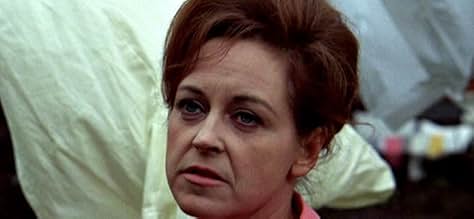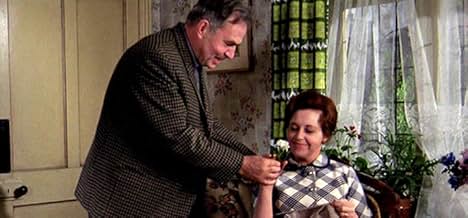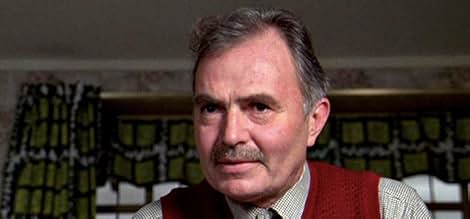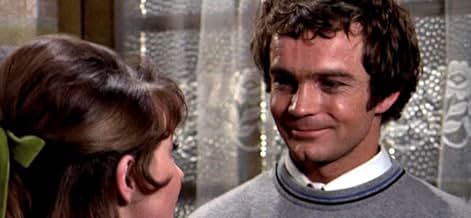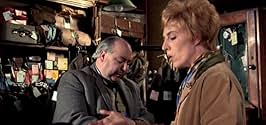CALIFICACIÓN DE IMDb
7.0/10
1.1 k
TU CALIFICACIÓN
Agrega una trama en tu idiomaA stern father and lenient mother try to deal with the ups and downs of their four children's lives in working-class Bolton.A stern father and lenient mother try to deal with the ups and downs of their four children's lives in working-class Bolton.A stern father and lenient mother try to deal with the ups and downs of their four children's lives in working-class Bolton.
Reginald Green
- Bowler 1
- (as Reg Green)
Opiniones destacadas
Even though I have lived abroad for more than 50 years, this film so perfectly captures the essence of life in northern England in the 50-60's that I cannot decide whether I want to go back there or stay away. Father knows best - no question. You do as you're told! You "tip up" on Fridays. Mother cooking fish on Friday pay day. Oh my gosh, it is all there. There are so many unforgettable scenes of northern working class life it is like a time warp for those of us who lived it.
For anyone in the future who may wonder what life was like back then when there was virtually full employment in the cotton mills, they could do worse than watch this film.
I wish this film were on TV regularly so that I could show my friends what it was like.
For anyone in the future who may wonder what life was like back then when there was virtually full employment in the cotton mills, they could do worse than watch this film.
I wish this film were on TV regularly so that I could show my friends what it was like.
I love this film 'Spring and port wine'. I was born in Leigh, a town about 7 miles away from Bolton, I moved to Bolton in 1965 when I was 20. My place of work was daily via Little Lever through Farnworth, sometimes on a bike but then by car when I could afford it.The film brings back all the memories of the working class neighbors who were almost always broke but who would always help you if they could. Fred Dibnah was round the corner from Bromwich St. were my bedsit was. If you didn't see the film when first released then you may be forgiven for comparing it to a soap such as Coronation St, well I agree it is a soap, but then, it was called 'Kitchen Sink Drama!' Watch this film for the talented cast who shortly afterwards became household names from frequent roles on TV, I watch mainly for the shots of the locality and the feel good factor of people being poor but happy!
To put it simply, I enjoyed this film. The reason for my interest & enjoyment was not related to anything other than the subject matter itself. I had heard tales from my mother and grandmother about how Northern England working class life and attitudes used to be (as experienced by them)and this is an interesting depiction that seems to faithfully represent what they told me. In particular, the paternalistic but overbearing father who "knows" what is best for his family along with his stubborness when this paradigm is challenged. (Not much has changed there then!!)
People who have seen the play will probably be disappointed with the film because the story does not easily transfer across the different media. In a sense however, the film is an historical document and I personally enjoyed it, if only because of the way it conveyed a social phenomenon.
People who have seen the play will probably be disappointed with the film because the story does not easily transfer across the different media. In a sense however, the film is an historical document and I personally enjoyed it, if only because of the way it conveyed a social phenomenon.
I have watched this film many times, and it always seems to get better. With great acting performance by James Mason, and the cast of this classic English film. If you have not seen it before, then I highly recommend that you do.
'Ee, it were right grim up north, especially if your dad was James Mason's Rafe Crompton, who the minute he enters the family home after putting in a shift at the local mill in Bolton, Lancashire, runs the roost with one hand on his wife's housekeeping money and the other on the Holy Bible. Diana Coup!and, later to play a similar part in a comedic manner opposite Sid James in the popular TV sitcom "Bless This House", is his adoring, but fearful wife who tries to keep the peace between father's draconian ways and their rebellious brood of four fast-growing children, all crammed under the one roof. He calls her "mother" and she calls him "father" which is enough to tell you the hierarchical rules of this particular household, but rebellion is in the air in the form of younger daughter Susan George, a free-spirit who duly picks her moment over a portion of herring put down before her at the family evening meal to at last revolt against the old man's outdated ways.
This sets off a chain reaction amongst the rest of the family as one by one they all, in their own ways, join in the revolution with old man Crompton standing his ground until the pressure finally tells on his wife at last forcing him to re-evaluate both himself and his draconian methods as head of the house.
While the ending is somewhat contrived and sentimental, betraying its origins as a stage play of the time, there's still much to enjoy here. The exterior shots of Bolton in the late 60's will strike a nostalgic chord with many of a certain age-group, to whom it will no doubt evoke memories of Dvorak's New World Symphony / Hovis advert, as well as recollections of the generation gap battles enacted here.
There are some frank dialogue exchanges, which while no doubt familiar in living rooms up and down the country are unlikely to have been heard much on the cinema screen.
Mason effects a fine Northerner's accent as the unyielding father figure while Coupland offers credible support as the recognisable "'er indoors", who with a mother's instinct, sees more than her husband and who gets caught in the crossfire. George is good too as the catalyst for change as are other recognisable faces from TV of the time, such as Rodney Bewes, Hannah Gordon and Frank Windsor.
As indicated, for dramatic purposes, I'd have probably preferred a darker ending but in the end my growing affection for the individual characters made me content with the "all's well that bloody ends well" conclusion presented instead.
This sets off a chain reaction amongst the rest of the family as one by one they all, in their own ways, join in the revolution with old man Crompton standing his ground until the pressure finally tells on his wife at last forcing him to re-evaluate both himself and his draconian methods as head of the house.
While the ending is somewhat contrived and sentimental, betraying its origins as a stage play of the time, there's still much to enjoy here. The exterior shots of Bolton in the late 60's will strike a nostalgic chord with many of a certain age-group, to whom it will no doubt evoke memories of Dvorak's New World Symphony / Hovis advert, as well as recollections of the generation gap battles enacted here.
There are some frank dialogue exchanges, which while no doubt familiar in living rooms up and down the country are unlikely to have been heard much on the cinema screen.
Mason effects a fine Northerner's accent as the unyielding father figure while Coupland offers credible support as the recognisable "'er indoors", who with a mother's instinct, sees more than her husband and who gets caught in the crossfire. George is good too as the catalyst for change as are other recognisable faces from TV of the time, such as Rodney Bewes, Hannah Gordon and Frank Windsor.
As indicated, for dramatic purposes, I'd have probably preferred a darker ending but in the end my growing affection for the individual characters made me content with the "all's well that bloody ends well" conclusion presented instead.
¿Sabías que…?
- TriviaWhen Arthur accidentally drives into the back of a car at the traffic lights (while kissing Florence), the driver of the car in front is the film's producer, Michael Medwin.
- ErroresThe first scenes are on a Friday evening after work. However, later when Rafe goes to play bowls, it is a bright, sunny day with the shadows suggesting it was shot around mid-day.
- Citas
Rafe Crompton: There's no father alive who doesn't long to escape his captivity every now and then...
- ConexionesEdited into Northern Soul (2014)
Selecciones populares
Inicia sesión para calificar y agrega a la lista de videos para obtener recomendaciones personalizadas
- How long is Spring and Port Wine?Con tecnología de Alexa
Detalles
- Fecha de lanzamiento
- País de origen
- Idioma
- También se conoce como
- Hering und Portwein
- Locaciones de filmación
- Sunnyside Mill, Bolton, Greater Manchester, Inglaterra, Reino Unido(was on Adelaide St., now demolished)
- Productora
- Ver más créditos de la compañía en IMDbPro
Taquilla
- Presupuesto
- GBP 198,000 (estimado)
- Tiempo de ejecución1 hora 41 minutos
- Mezcla de sonido
Contribuir a esta página
Sugiere una edición o agrega el contenido que falta

Principales brechas de datos
By what name was Spring and Port Wine (1970) officially released in Canada in English?
Responda

